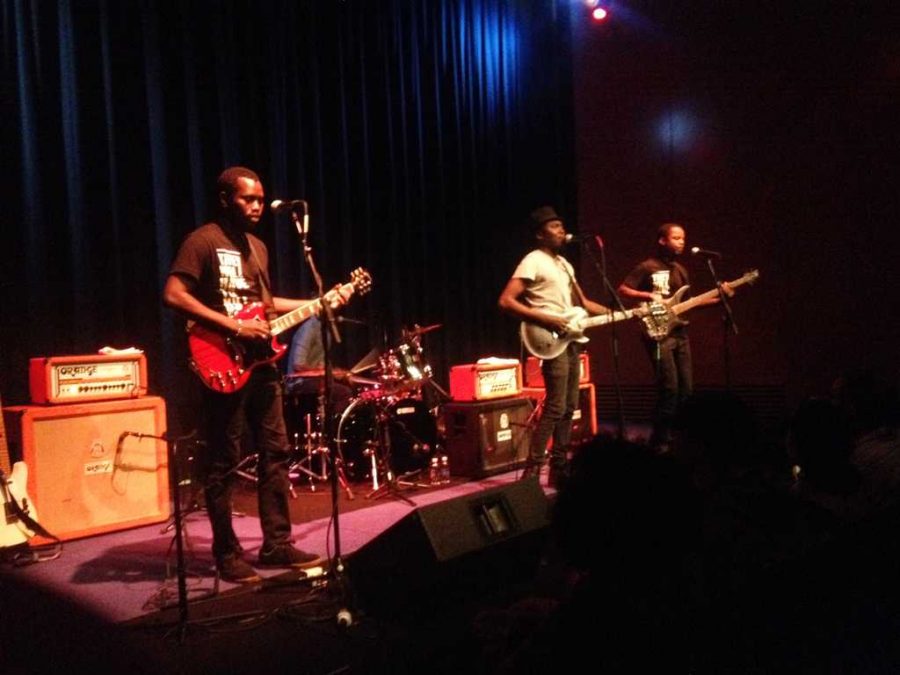Despite escaping violent oppression in the band’s native Mali, Songhoy Blues doesn’t make mournful music.
The Andy Warhol Museum hosted the Mali blues band, Songhoy Blues, Tuesday night as part of its Sound Series, bringing a slice of Mali rock ’n’ roll to the Steel City.
Songhoy Blues has a common set up — Nathanael Dembélé on drums, Garba Touré on lead guitar, Oumar Touré on bass and Aliou Touré on vocals and sometimes guitar — but its background is anything other than typical. The band left its northern Mali home in 2012 for the country’s southern capital in Bamako amid growing political unrest between the government and the Islamic terrorist group, Ansar Dine.
Ansar Dine seeks to outlaw alcohol, cigarettes and music, which pushed Songhoy Blues to take its music elsewhere, eventually ending up in North America. Songhoy Blues is currently touring to promote its first album, “Music In Exile,” which is how the band landed on the concert stage of the Andy Warhol Museum in the North Side.
After a rousing performance of the band’s speedy guitar-duelling ballad “Ai Tchere Bele,” Aliou stopped dancing to bring the mic close. “You love African music, yeah?” Following the crowd’s affirmative woos, Aliou said, “We love you too.”
Ben Harrison, the Warhol’s curator of performing arts, said the band’s genre-transcending style epitomizes the Sound Series’ goal — drawing unconventional live performances to Pittsburgh to subvert conventional perceptions of art.
The Warhol performing arts staff, Harrison said, is particularly interested in “hybrid forms that blend influences and blur traditional genre boundaries and explore new territory, such as western blues and R&B and West African melodies and overall sensibility.”
Describing Songhoy Blues as “desert blues” is fine enough, but as its guitars and drums picked up speed and turned the music into a melancholic bouncy blues, the band proved its music transcends setting.
Aliou’s vocals fill out each song, but when all four members sing at once, their sound recalls ancient folk songs. Those vocals over Garba’s guitar licks created a microcosm of the history of blues music, which originated from African folk tradition.
About 20 minutes into the concert, following the dreamy, bass-filled “Wayei,” Aliou noticed the crowd hadn’t started dancing yet. Aliou noticed this, asking, “So, you can move, yeah? We can all dance together later,” he said.
As a few songs passed, the quaint theater’s once empty aisles began to fill with dancing people. Soon enough, more than half of the bodies in the room were dancing in the spaces between seats and wherever they could.
During a lengthy guitar solo on the song “Al Hassidi Terei,” Aliou began to dance himself, spreading his arms like wings and yelling, “Are you ready to fly with me?” His movements morphed into a high-speed chicken dance, as Aliou flapped his bent arms against his torso.
Colter Harper, a University of Pittsburgh graduate and former professor at the University of Ghana, attended the event, and said Pittsburgh’s music scene could stand to be a little more diverse.
“[Songhoy Blues] are amazing musicians,” he said. “Pittsburgh does not have enough music from Africa, enough music from Brazil. I’d like to see more of it.”
Though Aliou sings all of Songhoy Blues’ songs in the band’s native Songhay language, each song’s message isn’t lost in translation, thanks to the four piece’s distinctive rhythm and Aliou’s stage presence.
“Music is one of the only things we can share,” Aliou said between songs. “No one ever knows what we say, but you enjoy. That is music.”



